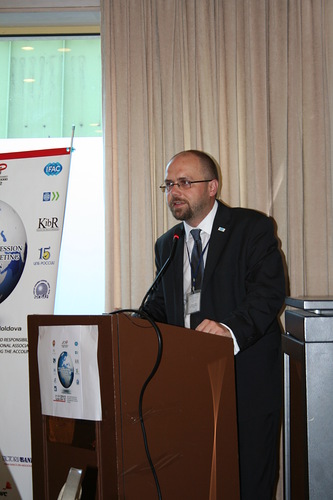International Federation of Accountants Chief Executive Officer Ian Ball today praised the Pan African Federation of Accountants (PAFA) for its recent decision to adopt international standards in accounting and auditing, calling it “an important benchmark in underscoring the value of accountancy and the accountancy profession to governments and to business on the African continent.”
PAFA was launched in May 2011 and consists of 39 professional accountancy organizations from 34 African nations. Its General Assembly took the action at the inaugural meeting held May 4 in Tunis, Tunisia, resolving to adopt:
- International Standards on Auditing (ISAs) developed by the International Auditing and Assurance Board (IAASB);
- International Public Sector Accounting Standards (IPSASs) developed by the International Public Sector Accounting Standards Board (IPSASB);
- International Education Standards (IESs) developed by the International Accounting Education Standards Board (IAESB);
- International Financial Reporting Standards (IFRSs) developed by the International Accounting Standards Board (IASB);
- International Financial Reporting Standards for Small and Medium Enterprises (IFRS for SMEs) developed by the IASB; and
- Code of Ethics for Professional Accountants developed by the International Ethics Standards Board for Accountants (IESBA).
“ISAs provide the framework against which the auditor examines a company’s financial statements and judges whether they can be relied upon by investors, capital market participants, and policymakers,” Ball said. “The adoption of IPSASs, along with international standards on education and ethics, is particularly important in Africa, and so this resolution by PAFA is an important milestone. A sound financial infrastructure—in the form of high-quality, recognized standards in auditing, ethics, public sector accounting, and related regulation—is the only way that sustainable economic development is truly achievable as Africa seeks a larger role in the global economy.”
PAFA’s resolution reflects strong support for IFAC’s Statements of Membership Obligations (SMOs), which form the basis of the IFAC Member Body Compliance Program. SMOs serve as a framework for credible and high-quality professional accountancy organizations focused on serving the public interest. PAFA’s resolution underscores the SMO requirements for IFAC members and associates to adopt and support implementation of international standards and maintain adequate enforcement mechanisms to ensure the professional behavior of their individual members.
The SMOs are issued under the IFAC Board’s authority, and the Compliance Advisory Panel (CAP), together with IFAC Compliance staff, is responsible for reviewing their continuing relevance and sufficiency.
About IFAC
IFAC is the global organization for the accountancy profession dedicated to serving the public interest by strengthening the profession and contributing to the development of strong international economies. IFAC is comprised of 167 members and associates in 127 countries and jurisdictions, representing approximately 2.5 million accountants in public practice, education, government service, industry, and commerce.
# # #

